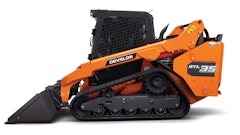
Part 1: Role of Engine Oil and Filters in Equipment Performance
MICHAEL: What roles do engine oil and filters have in extending performance and equipment lifespan on the jobsite?
JIM: Your engine oil is paramount, right, that's probably your first line of defense in making sure that your equipment at the jobsite or application is operating as efficiently as possible. It's helping that engine continue to move and again, move as efficiently as possible. And not only is it allowing the engine to do what it needs to do; it's protecting the engine from particulates and contaminants that could potentially get in and seize up an engine or cause issues from dirt.
MICHAEL: Now let’s talk about engine protection.
JIM: Sure, so engine, the oil and especially the filter is capturing any dirt or debris, or other foreign material and contaminants that could get into the engine. That's a preventative measure, to protect against potential damage or some of those costly repairs that I mentioned before. The engine oil and filter are protecting the engine to ensure that it's operating as intended.
MICHAEL: About contaminants and protection, what contaminants impact performance? Can you go over a few of their sources and how they affect engines?
JIM: We certainly want to start with oil oxidation. And essentially, what that is, is the thermal breakdown and degradation of oil. And that is a result of high heat and lots of pressure. What ends up happening is the oil thickens and it kind of forms the sludge. This can lead to seizing up the engine and really causing some costly repairs in the long run. With the way that engines are built today, with lower emissions and some of the standards that we must hit, they are operating in a very high heat and a high-pressure environment. You really want to be aware of that to making sure that you're using oil and filters that prevent against that.
Harmful particulates can affect the engine and its moving parts. Any sort of foreign material that causes abrasion or gets in there can really decreased the engine life and the efficiency. It certainly is the job of the engine oil and filter to prevent that from happening.
Part 2: Choosing Engine Oil and Filters
MICHAEL: Okay, great. How do you choose an engine oil and engine filter? What factors can be considered in that process? As mentioned before, these options are closely related to emission standards as well and making sure that a lot of projects comply with these standards. Can you go over some of these factors?
JIM: The operator's manual for the specific piece of equipment will recommend what the engine oil and engine filter type should be. Also talking to your dealership is a good approach, as they have great experience. They see a lot of different pieces of equipment. They probably understand the environment and the terrain very well.
They can make some recommendations on viscosity and what you should be using. The operator themselves should also consider the conditions that they're operating in. For example, the ambient temperature, the workload of the specific piece of equipment and type of terrain; all these factors can help you sort of customize or dial into the type of oil and filter you should be using. But again, it's going to spell it out explicitly.
I kind of briefly touched on viscosity grade. Looking at that for colder temperatures, we typically recommend a thinner viscosity for the oil. The engine just works better with those types of conditions. On the opposite side, and the hotter temps you want a thicker viscosity.
MICHAEL: Looking at the other end of that, what are the risks of choosing the wrong engine oil?
JIM: You are compromising machine performance by using substandard or aftermarket oil and filters. Typically, those products are not tested to any sort of standard. They're certainly not tested by Case Construction and our engineering group. They may claim that it meets the standard.
If your machine is under warranty and you're not using what's specified within the operator's manual, you're compromising your warranty, right? Some things may not be covered. Whereas if you were using the specified OEM genuine product that warranty would stand still stand strong, it would still be honored.
MICHAEL: Right, yeah. That's an interesting point. I didn't realize how far that would apply, but it does apply to here as well.
Part 3: Comparing Genuine Engine Oil and Filters with Aftermarket Products
MICHAEL: Why is genuine better than aftermarket oil? Can you explain the difference and the benefits of going with a genuine product versus an aftermarket?
JIM: Sure, absolutely. That's a fun area to talk to talk about. Because that really is the value proposition and using what's recommended in the operator's manual. I think, that's the best-selling point there is right? That's it's backed by the organization. As I said before, some of the aftermarket products, they may claim that they have tested it. I also think aftermarket companies might be selling old oil specifications. I mentioned earlier about the engines and low emissions and how they're operating at higher pressures - higher temperatures than we've seen 10 to 15 years ago. Aftermarket may have claimed it previously, it worked well during that time. But who knows if that's still the case. In these Tier 4 engine types, it's important to have that as a consideration. Our oil has a superior resistance to oxidation, as well as deposit controls.
Case Construction uses a synthetic media type in their engine filters, not a paper-based media type. This helps ensure that we're getting as much as we can out of that oil, which extends your service intervals. One thing that's very important to touch on is the material standard designation.
Compared to aftermarket products, we're going to have a longer drain interval. Focusing on the filters, I know I've talked quite a bit about the oil, but the construction of the filter is certainly different than the aftermarket competitors. Everything from the baffle, the seal the filter media, the spring and the canister, those are all engineered and developed by Case Construction to work as intended.
MICHAEL: Okay. I just want to kind of go over something that you mentioned that I thought that was kind of interesting. You mentioned that Case goes with a synthetic media filter and aftermarket filters go with paper. What’s the difference?
JIM: Sure. At the end of the day, Michael, it's more efficient. These synthetic materials are able to capture more contaminants for a longer period of time. That's what increases your intervals in between service. It is like comparing a coffee filter to a reverse osmosis water purification system, right, it's just a tighter filter membrane, which allows less particulates to get through.
We're applying that same similar technology, and we're capable, or we're able to do that, because we're using a synthetic media type. Whereas, some of the aftermarket products to save a few pennies are using a paper-based media filter type. But again, that does not filter as efficiently as something as robust as a synthetic media type.
Register a free IRONPROS account to access product search tools, customer reviews and more!



























